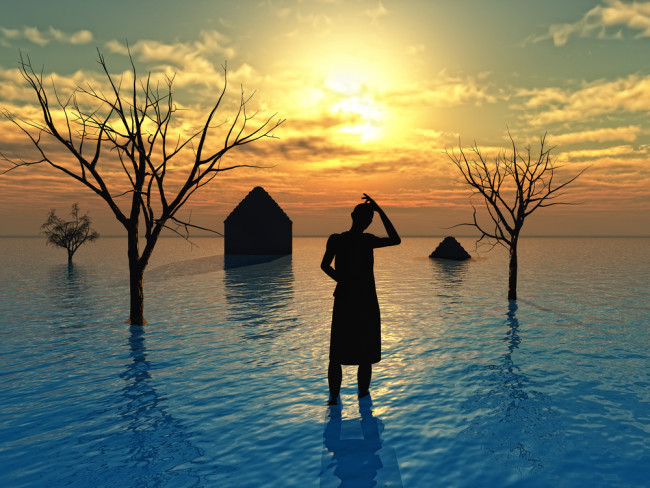Religion and Bipolar Disorder

I’ve always found monks to be glamorous. The robes, the ritual and the prospect of a life of contemplation draws me to retreats at monasteries and, subsequently, the devout meditation practice that has made my recovery possible. That I teach and write about secular meditation sometimes seems to cheat my practice of its important spiritual aspects.
Years ago I considered entering a monastery and taking vows. Then I met my wife – at a monastery. Love, prayer and service took on new forms and my fantasies of living a cloistered life faded away. I still go on retreats, but I live solidly in the material world. Oddly, this removal of movement toward a future as a monk has made my practice more focused, more practical and, in some very personal ways, more spiritual.
I’ve had a complicated relationship with religion. At times I fully embraced the idea of God, at others I completely rejected religion as mere delusion. I never seemed ambivalent about faith, but I always changed my mind as my moods coalesced into furious yet inspiring mixed episodes, episodes in which mania and depression occur together, that left me full of religiosity and wrestling with big questions and supernatural forces.
Such religiosity is considered by some to be a symptom of mixed episodes. I’m afraid that dismissing flights of spirituality as mere symptoms can alienate a person of faith from treatment that can help them find stability and practice their faith with surety and charity.
I focus on mixed episodes because I’m familiar with them and have had so many, and because a comprehensive study found mixed episodes to be highly correlated with private religious practice. Whereas people who experienced distinct episodes of mania and/or depression illustrate religious fervor in-line with the general population, those of us who experience predominately mixed episodes are much more drawn to religious practice.
This should come as no surprise. When I read accounts of both spiritual suffering and rapture by spiritual masters their experience sounds so much like the rush of inspiration and pain, doubt and certitude, dreams and visions that I have experienced during my most intimate suffering with bipolar disorder. Mixed episodes are both enlightening and fraught with terror. So many saints and shamans have experienced the same thing.
Perhaps I should leave it at that. For to the clinical the idea of true spiritual transformation seems mere fantasy, and to the faithful the idea of passing off religious experience as a pathology of a disease is misguided. Let science doubt and let faith be solid. Efforts to reconcile the two seem instantly doomed by each discussant’s predisposition toward or against religious practice. Some will always see religion as necessary to individual and community thriving, and some will always pass it off as delusional fantasy. That most of us find ourselves somewhere between the two seems comfortable and settled. Faith is both an individual and a community practice and our feelings about it, either for it or against it, largely define us.
Yet the profound suffering of mixed episodes, and the higher occurrence of private religious practice in those of us who experience them, leads many to inquire as to the origins and consequences of such suffering and such practice.
In my personal experience both mixed episodes and faith have been transformational. I’ve had visions and I’ve felt things. That has left me a changed, and hopefully more empathetic, person. But equally transformational has been the doubt and rejection of spirituality that has often shaken me.
The influence and importance of religion on community and morality will always be apparent and easy to debate. The personal experience of the practitioner can never be so and must be taken on faith. The study I cite clearly lays out the fact that people who have mixed episodes are very likely to have a private religious practice and often feel moved to religious experience. The reality of such experience, as also the question of whether religious experience moves one toward mixed episodes or mixed episodes move one toward religious experience, cannot be settled by science and statistics.
We are an inquisitive and doubting bunch, so we’ll always try to use our reason to settle such questions. But we’re inclined toward spirituality as well. And for many, spirit transcends reason and leads to greater understanding. A mixed episode can take us there as well, or it can leave us dreadfully desperate. How we approach, make room for and hold the occurrence of private religious practice in the treatment of bipolar disorder, how we seek to ameliorate the aspects of bipolar disorder that make us suffer and uphold the aspects of bipolar disorder that reinforce us, can make all the difference in our ability to live meaningful lives of service and health.

